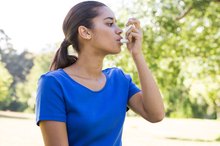What does fact checked mean?
At Healthfully, we strive to deliver objective content that is accurate and up-to-date. Our team periodically reviews articles in order to ensure content quality. The sources cited below consist of evidence from peer-reviewed journals, prominent medical organizations, academic associations, and government data.
The information contained on this site is for informational purposes only, and should not be used as a substitute for the advice of a professional health care provider. Please check with the appropriate physician regarding health questions and concerns. Although we strive to deliver accurate and up-to-date information, no guarantee to that effect is made.
Swimming With a Cough
Having a cough while you swim can interfere with your performance and endurance. Exposure to pool chemicals; chronic conditions such as allergies or asthma; or respiratory infections can all cause you to cough as you swim. Fortunately, you can prevent or treat coughing related to swimming by changing your routine and/or with medications and medical care.
If you are experiencing serious medical symptoms, seek emergency treatment immediately.
Symptoms
You might notice coughing more often when you are swimming at a fast pace or when you are swimming in an enclosed, chlorinated pool. Your coughing might linger even after you finish swimming. You might also notice additional symptoms, including tightness in your chest, difficulty breathing and decreased performance while you swim.
Causes
What Are the Causes of Phlegm When Swimming?
Learn More
Breathing in halogen gases such as chlorine and bromine, which are used in the chemical treatment of pool water, can cause you to cough while swimming. Swallowing pool or lake water while swimming might also make you cough, especially if there are chemicals or particulates in the water. Medical conditions such as asthma, exercise-induced asthma and allergies can cause you to cough while you swim, especially if you attempt to swim at a vigorous pace 2. If you have both allergies and asthma, your risk of developing symptoms such as coughing is greater. Swimming might exacerbate your cough if you have a respiratory illness such as influenza, a cold, bronchitis or pneumonia, or if you smoke.
- Breathing in halogen gases such as chlorine and bromine, which are used in the chemical treatment of pool water, can cause you to cough while swimming.
- Medical conditions such as asthma, exercise-induced asthma and allergies can cause you to cough while you swim, especially if you attempt to swim at a vigorous pace 2.
Treatments
Taking an over-the-counter or prescription allergy relief medication -- such as an antihistamine or decongestant -- before you swim can treat or even prevent coughing. If you suffer from asthma or exercise-induced asthma, warming up and cooling down for 15 minutes before and after your swim might also reduce or prevent coughing while you swim, advises the American Academy of Family Physicians 2. In addition, taking your asthma medication before swimming and bringing a fast-acting medicine such as a rescue inhaler can treat coughing during and after a swim. Allow viral infections such as colds and influenza to resolve before returning to swimming, advises the National Library of Medicine 2.
Prevention
When I Lay Down to Go to Sleep I Start Coughing
Learn More
Swim in an outdoor pool or wear a nose clip while you swim to help prevent coughing related to respiratory exposure to pool chemicals. Inspect the facility records at the pool where you swim to check the levels of chemicals, especially if you have asthma or allergies that are worsened by environmental exposure. Breathing through your nose while you swim might also help prevent you from coughing, especially if you have asthma or exercise-induced asthma, advises the National Library of Medicine 2.
- Swim in an outdoor pool or wear a nose clip while you swim to help prevent coughing related to respiratory exposure to pool chemicals.
- Inspect the facility records at the pool where you swim to check the levels of chemicals, especially if you have asthma or allergies that are worsened by environmental exposure.
Related Articles
References
- National Library of Medicine: Exercise-Induced Asthma
- American College of Allergy, Asthma and Immunology: Chlorine Allergy -- Real Or Myth?
- O'Byrne PM. Patient education: Exercise-induced asthma (Beyond the Basics). In: UpToDate. 2017.
- Storms WW. Asthma Associated With Exercise. Immunol Allergy Clin North Am. 25(1):31-43.
Writer Bio
Jessica Lietz has been writing about health-related topics since 2009. She has several years of experience in genetics research, survey design, analysis and epidemiology, working on both infectious and chronic diseases. Lietz holds a Master of Public Health in epidemiology from The Ohio State University.









